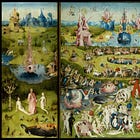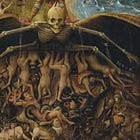NOTE: Occasionally, life gets in the way, and this week, we’ve been hit by a perfect storm of sickness and reduced childcare. So, unfortunately, this post is bare bones with no audio. I will circle back later to fill out my notes for this week. It’s a good week, and it pains me to leave it unfinished! Thank you for your patience and understanding. Simon
To get these updates in your inbox, subscribe to Footnotes and Tangents and turn on notifications for the Cromwell Trilogy.
Welcome to week 26 of Wolf Crawl
This week, we are reading the second of five parts of ‘Master of Phantoms, London, April–May 1536’. This section runs from page 323 to 361 of the Fourth Estate paperback edition. It starts with the line, ‘Mark at Stepney’ and ends: ‘We shall have no trouble with her now.’
You will find everything you need for this read-along on the main Cromwell trilogy page of my website, including:
Weekly updates, like this one
Online resources about Mantel’s writing and Thomas Cromwell
This is a long post and may get clipped by your email provider. It is best viewed online here.
Last week’s post:
This week’s story
Mark Smeaton comes to Cromwell’s house at Stepney. He brings his lute, but he does not play. ‘Five rash minutes of boasting’ is all it takes to undo him. He admits to sleeping with the queen. He, Master Secretary, wants a written confession and a list of names. When Smeaton falters, he threatens him with five minutes with Christophe, and more besides.
Christophe locks Mark in with Christmas, so the star in its sleeves can torture him. Grace’s angel wings can frighten him. He, Cromwell, does not sleep that night. And in the morning, names tumble from the musician: Norris, Weston, Brereton, Wyatt. ‘No, not Wyatt,’ Cromwell says. Call-Me queries why he protects Wyatt. He thinks Wriothesley would not understand.
‘1 May 1536: this surely, is the last day of knighthood.’ Smeaton to the Tower, Richard Cromwell to the jousts to whisper in the king’s ear. By night, Norris is in custody and the King of England is alone, with his demons and his doubts, and with Thomas Cromwell.
Now, they come for Anne. She is charged with adultery in the council chamber and arrested in her own rooms. The king’s councillors escort her by the river to the Tower. Her uncle Norfolk comes along to gloat and to taunt. He looks ready to drown his niece for a witch.
Outside the Tower, Anne collapses. He helps her up, but when she hears she will be lodged in her coronation chambers, she cries, ‘It is too good for me.’ He recognises this not as a confession of guilt but of failure. She has lost the king, and ‘is dead to herself. We shall have no trouble with her now.’
Keep reading with a 7-day free trial
Subscribe to Footnotes and Tangents to keep reading this post and get 7 days of free access to the full post archives.





